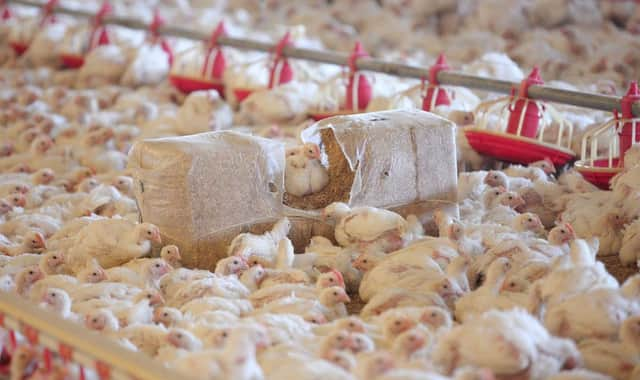CAFRE Management Notes: Poultry


Many of these migratory birds are water fowl and will rest throughout their long journey, with others flying straight in. With wild birds comes the risk of potentially harmful diseases, one of which is Avian Influenza.
For free-range systems ensure the range is not a suitable habitat for these birds so they won’t want to land. Fill in any wet areas or puddles on the range as these are ideal for their needs. For indoors systems faeces from migratory birds passing over can be brought into the house on boots. Reduce this risk through vigilant hygiene and biosecurity.
Biosecurity
Advertisement
Hide AdAdvertisement
Hide AdConstantly review hygiene and biosecurity as this is the only defence you have to reduce the risk of disease. Limit visitors to the site with only essential ones gaining access. Try to minimise foot traffic between houses and keep house specific boots and overalls in each control room. Replenish foot dips twice weekly; foot dips that are not lidded and outdoors may require more frequent changing. Ensure all vehicles are clean before entry and that all wheels are sprayed. Check egg trolleys and trays are clean before allowing them into the egg store. Maintain a robust rodent control programme and keep outside areas maintained. Tall grass and weeds provide ideal coverage for rodents which carry salmonella.
There are company specific biosecurity programmes set out for your benefit and great time and effort goes into this area to help protect your farm. Disease in a flock can have a huge financial impact on your business and can also spread to neighbouring farms.
Ventilation/heating
Another autumn/winter issue is that of cooler air moving across the country leading to higher moisture content in the outside environment. Moving to winter settings allows you to monitor and regulate air entering buildings even more closely.
Lower winter temperatures cause air entering the house to fall to the floor very quickly due to the increased weight of moisture, instead of mixing with the warmer air in the house and falling more slowly. As this cold, damp air falls, bedding/litter can start to ‘go off’ even in the early stages. It is therefore crucial to adjust ventilation and heating on a daily, or even hourly basis, to combat this effect. With many farms now using hot water heating systems many of the problems associated with this have been minimised but attention must still be paid.
Brooding
Advertisement
Hide AdAdvertisement
Hide AdCorrect brooding is especially important in winter. The first 24 to 48 hours are crucial in the bird’s life as this can affect health and performance throughout the whole production cycle. It is therefore extremely important to get the air and floor temperatures correct for newly placed chicks/poults as they don’t have the ability to regulate their own body temperature until they are 12-14 days old. While the brooding method does not change with regard to temperatures and relative humidity inside the house, the cost and time to achieve the same results may increase.
There are a wide variety of heating systems within Northern Ireland, from direct LPG heating to hot water heating and also some under floor systems. All are designed to provide the heating necessary to brood chicks although each varies in its operation. For example, while they all have the ability to achieve target temperatures they may require differences in lead times. Ensure floors below the litter are pre-heated to approximately 30oC. A much higher air temperature may be required to allow this heating process to happen.
You will know temperatures are acceptable if chicks are moving throughout the house and eating/drinking as soon as possible.